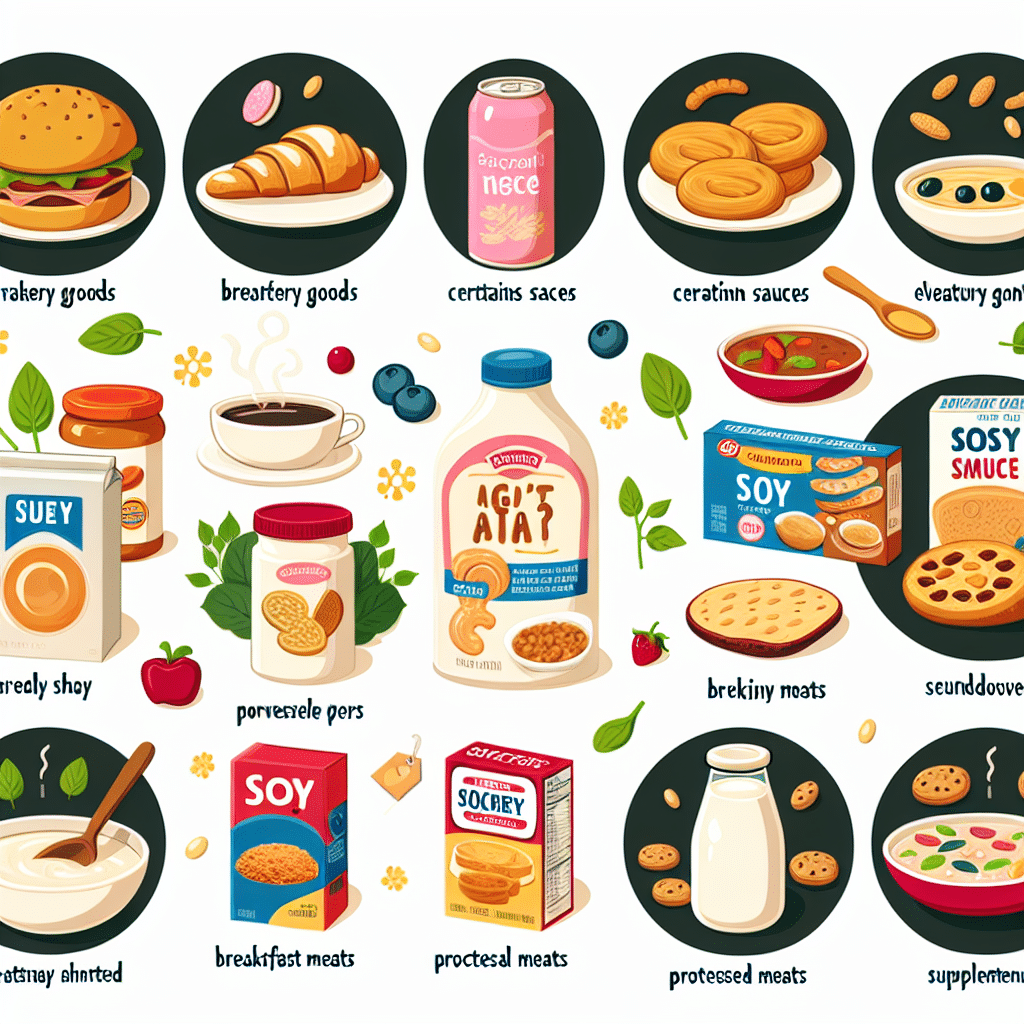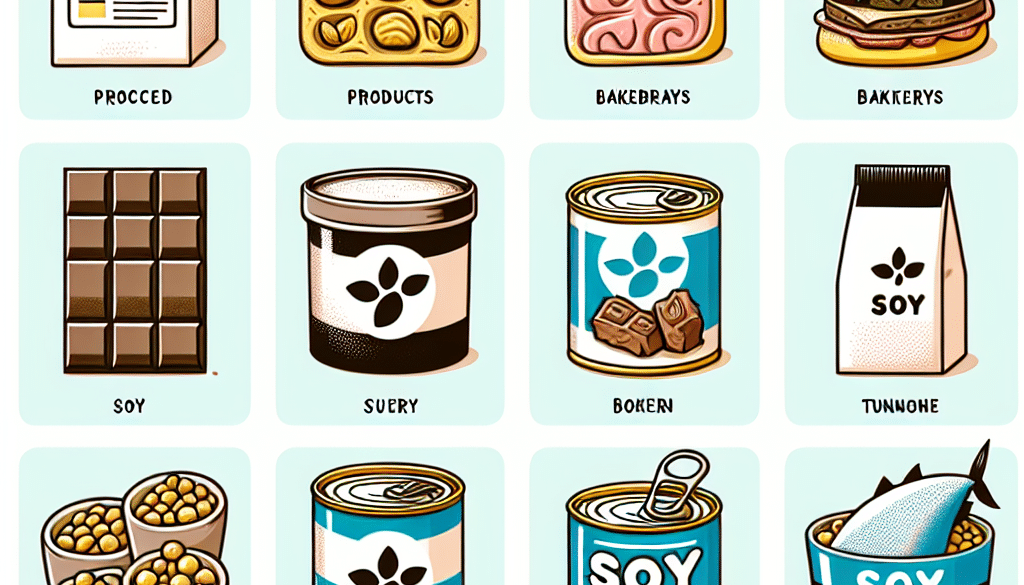What Foods Is Soy Hidden In?
-
Table of Contents
- Soy Hidden in Foods: Uncovering the Unexpected Sources
- The Ubiquity of Soy in Processed Foods
- Common Processed Foods Containing Soy
- Hidden Soy in Unexpected Places
- Surprising Foods with Hidden Soy
- Decoding Labels: Identifying Soy in Ingredient Lists
- Alternative Names for Soy on Food Labels
- Case Studies and Statistics: The Impact of Hidden Soy
- Impact on Individuals with Soy Allergies
- Strategies for Avoiding Hidden Soy
- Conclusion: Navigating a Soy-Prevalent Food Landscape
- Discover ETprotein’s Soy-Free Protein Products
Soy Hidden in Foods: Uncovering the Unexpected Sources

Soy is a versatile ingredient that has found its way into a myriad of food products, often in places you might not expect. While soy can be a nutritious addition to many diets, it can also pose challenges for those with allergies, intolerances, or dietary restrictions. This article delves into the various foods where soy is often hidden, providing insights and guidance for consumers looking to navigate their dietary choices more effectively.
The Ubiquity of Soy in Processed Foods
Soybeans are a staple crop used in a wide range of food products. Their versatility and nutritional profile make them a popular choice for manufacturers. However, this also means that soy can be found in many processed foods, sometimes in forms that are not immediately recognizable.
Common Processed Foods Containing Soy
- Vegetable Broths and Bouillon Cubes: Soy protein is often used to enhance the flavor and nutritional content.
- Canned Soups: Many canned soups contain soy as a thickener or protein source.
- Meat Substitutes: Products designed to mimic the taste and texture of meat are frequently made from soy.
- Dairy Alternatives: Soy milk, cheese, and yogurt are popular dairy-free options.
- Condiments: Soybean oil and soy lecithin are common ingredients in dressings, mayonnaise, and sauces.
- Snack Foods: Chips, crackers, and energy bars often include soy protein or soy lecithin as emulsifiers.
- Baked Goods: Soy flour and soy oil are used in bread, cookies, and pastries.
- Breakfast Cereals: Soy ingredients can be found in many cereals, both as protein boosters and binders.
Hidden Soy in Unexpected Places
While it’s no surprise to find soy in tofu or edamame, there are many other products where soy lurks behind the scenes. These hidden sources can be particularly problematic for those trying to avoid soy for health reasons.
Surprising Foods with Hidden Soy
- Meat Products: Processed meats like sausages, deli meats, and hot dogs may contain soy protein as a filler.
- Seafood-Based Products: Imitation crab and other seafood substitutes often use soy as a binding agent.
- Energy Drinks: Some energy drinks use soy protein isolate to increase their protein content.
- Alcoholic Beverages: Certain beers, especially stouts, may use soy-based additives.
- Chocolates and Sweets: Soy lecithin is a common emulsifier in chocolate bars and candies.
- Supplements: Many vitamins and nutritional supplements use soy derivatives as carriers or fillers.
Decoding Labels: Identifying Soy in Ingredient Lists
Understanding food labels is crucial for those trying to avoid soy. Soy can be listed under various names, making it challenging to identify without careful scrutiny.
Alternative Names for Soy on Food Labels
- Hydrolyzed vegetable protein (HVP)
- Textured vegetable protein (TVP)
- Monodiglyceride and monosodium glutamate (MSG)
- Lecithin
- Natural and artificial flavors
- Vegetable oil and vegetable starch
It’s important to note that products labeled as “soy-free” may still contain soy derivatives, so always check the full ingredient list.
Case Studies and Statistics: The Impact of Hidden Soy
The prevalence of soy in food products has significant implications for public health, particularly for those with soy allergies or sensitivities. Studies have shown that soy is among the top eight allergens, affecting a considerable portion of the population.
Impact on Individuals with Soy Allergies
For individuals with soy allergies, exposure to hidden soy can lead to serious health consequences. Anaphylaxis, a potentially life-threatening allergic reaction, can occur in severe cases. Therefore, vigilance in reading labels and understanding the various names for soy is essential for those at risk.
Strategies for Avoiding Hidden Soy
Avoiding hidden soy requires a proactive approach to food selection and preparation. Here are some strategies to help minimize the risk of unintentional soy consumption:
- Prepare meals at home using whole, unprocessed ingredients.
- When shopping, choose fresh produce, meats, and dairy over processed alternatives.
- Read labels carefully, looking for any of the alternative names for soy.
- Communicate dietary restrictions clearly when dining out or purchasing prepared foods.
- Consider using a food diary or app to track and identify potential sources of soy in your diet.
Conclusion: Navigating a Soy-Prevalent Food Landscape
In conclusion, soy is a common ingredient in many food products, often hidden under various names. For those with allergies, intolerances, or dietary preferences that exclude soy, it is crucial to be vigilant about reading labels and making informed food choices. By understanding where soy may be lurking and adopting strategies to avoid it, individuals can better manage their dietary needs and maintain their health.
Discover ETprotein’s Soy-Free Protein Products
If you’re looking for high-quality, soy-free protein options, ETprotein offers a range of organic bulk vegan proteins that are non-GMO and allergen-free. Their products, including rice protein, pea protein, and various seed proteins, provide excellent alternatives for those avoiding soy. With a commitment to purity and a neutral taste, ETprotein’s offerings are suitable for a variety of industries and dietary requirements.
About ETprotein:
ETprotein, a reputable protein and L-(+)-Ergothioneine (EGT) Chinese factory manufacturer and supplier, is renowned for producing, stocking, exporting, and delivering the highest quality organic bulk vegan proteins and L-(+)-Ergothioneine. They include Organic rice protein, clear rice protein, pea protein, clear pea protein, watermelon seed protein, pumpkin seed protein, sunflower seed protein, mung bean protein, peanut protein, and L-(+)-Ergothioneine EGT Pharmaceutical grade, L-(+)-Ergothioneine EGT food grade, L-(+)-Ergothioneine EGT cosmetic grade, L-(+)-Ergothioneine EGT reference grade and L-(+)-Ergothioneine EGT standard. Their offerings, characterized by a neutral taste, non-GMO, allergen-free attributes, with L-(+)-Ergothioneine purity over 98%, 99%, cater to a diverse range of industries. They serve nutraceutical, pharmaceutical, cosmeceutical, veterinary, as well as food and beverage finished product distributors, traders, and manufacturers across Europe, USA, Canada, Australia, Thailand, Japan, Korea, Brazil, and Chile, among others.
ETprotein specialization includes exporting and delivering tailor-made protein powder and finished nutritional supplements. Their extensive product range covers sectors like Food and Beverage, Sports Nutrition, Weight Management, Dietary Supplements, Health and Wellness Products, and Infant Formula, ensuring comprehensive solutions to meet all your protein needs.
As a trusted company by leading global food and beverage brands and Fortune 500 companies, ETprotein reinforces China’s reputation in the global arena. For more information or to sample their products, please contact them and email sales(at)ETprotein.com today.














